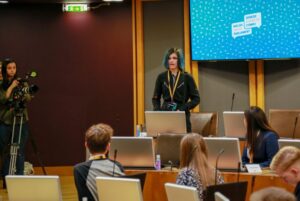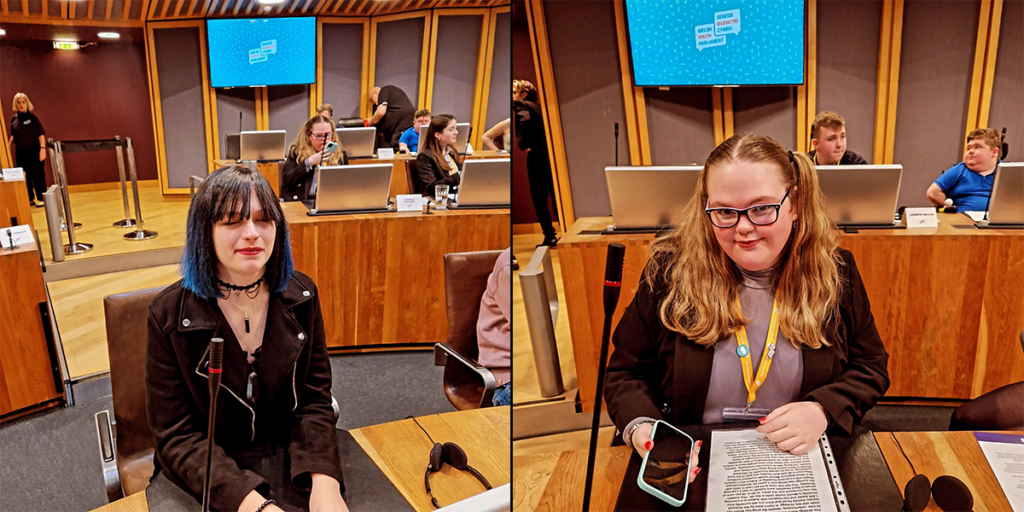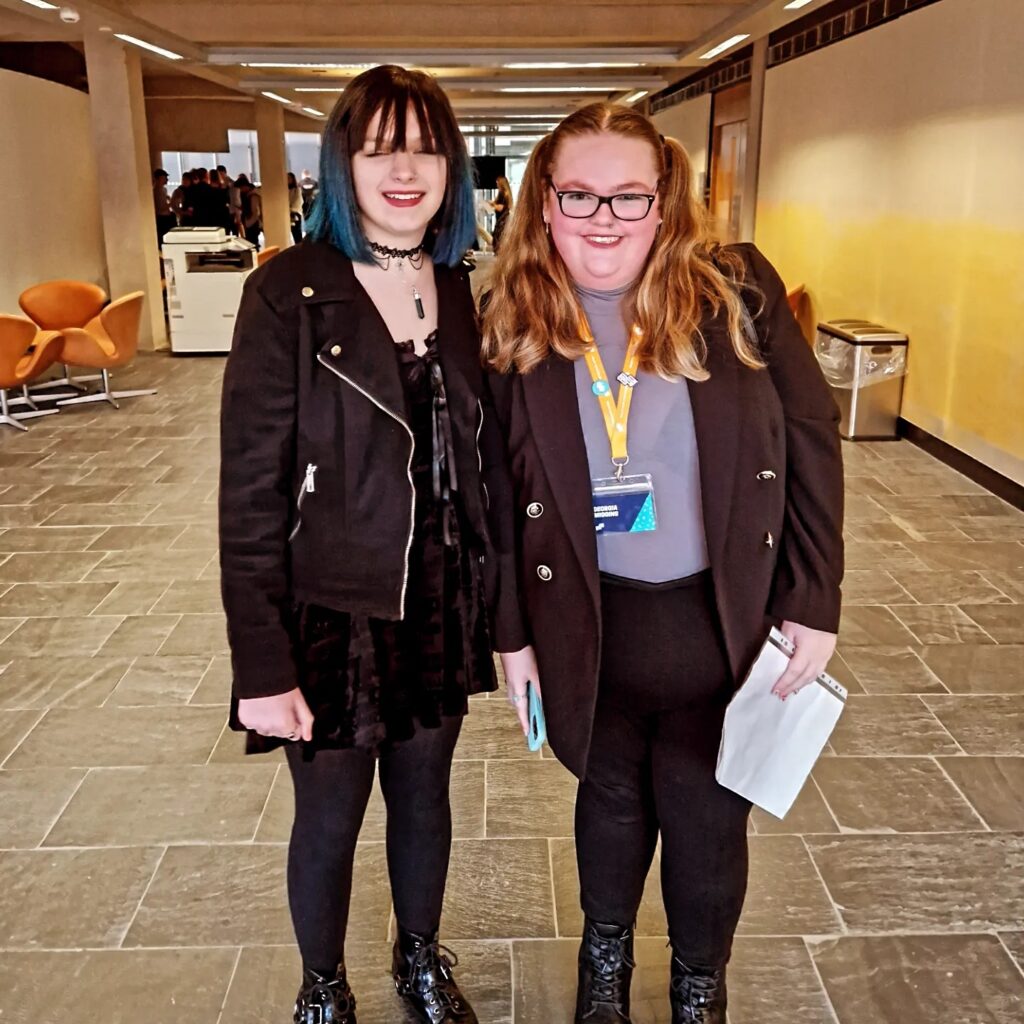
Welsh Youth Parliament Member Tegan Skyrme has written a new blog about the need to improve mental health services for disabled people. Tegan is 1 of 2 Welsh Youth Parliament Members currently supported by Learning Disability Wales.
Disabled people face many challenges in their day to day lives, but one thing that is often not talked about is how this can affect their mental health. Disabled people are statistically more likely to struggle with mental health issues and are at a greater risk of being socially isolated, often suffering abuse and bullying because of their disability.
You might assume that mental health services are easily accessible to disabled people and that the professionals working within these services are trained in how to work with disabled people with a variety of impairments. Unfortunately, this is often not the case.
Living in a world not made for us
As someone who lives with a severe visual impairment, I understand how difficult it can be to live in a society that just isn’t made for me, to have to work twice as hard as everyone else just to reach the same goals. I also know how it feels to struggle with my mental health, both related and unrelated to my impairment. I have seen firsthand that mental health services are not always accessible to disabled people like me.
In 2021 I was elected as a Welsh Youth Parliament Member, representing Learning Disability Wales. As part of my role, I became a member of the Mental Health and Wellbeing Committee as this is a topic I feel very strongly about. As my term of office is coming to an end in December 2023, I want to ensure that this topic gets brought to light as it is so important and something that I care deeply about.
When someone is struggling with their mental health, they are told to reach out for help and support. But what if the relevant information isn’t accessible to all? This is why all written information needs to be accessible, not only in braille but also in large print, easy read, audio, video and high contrast versions. Something as simple as creating these resources could help to ensure that nobody is left unaware of where they can get support and how to get it.

(Photo above: Tegan and Georgia sitting at their desks at the December 2023 Welsh Youth Parliament in the Siambr debating chamber)
Training about mental health
When accessing mental health support, it is important that mental health workers are given the necessary training and are made aware of how to work with and support disabled people who are struggling. It is also extremely important that this training raises awareness of how mental health symptoms may present very differently in disabled people and those who are neurodivergent.
Mental health conditions in disabled people often go undiagnosed or are not dealt with correctly simply because of a lack of understanding. Some disabled or neurodivergent people find it extremely difficult to communicate how they are feeling or what exactly is going through their mind. The fact that the professional you speak to may not understand or listen to you properly can make asking for help an extremely daunting, stressful and often negative experience.
I recently had a personal experience in my college where I came forward to ask for a “green card”. A green card is a type of reasonable adjustment often used in schools and colleges that allows certain students with additional learning needs to step out of lessons if necessary, for example to take a break or go to a quiet room.
Due to my eye condition, I frequently get headaches and migraines caused by eye strain and sensitivity to light. Due to my lack of sight, high levels of sound can also be very overwhelming. As I had previously had something very similar in my last school, I thought that there would be no issue.
However, I was told by the college that “leaving the class would not stop these things from happening.” This is both incorrect and frankly not the point of having the card. I was also told that if I did get one, I would have to walk quite a distance from where I study, which is obviously an accessibility issue. This really demonstrated the lack of understanding of my condition and how it affects me on a day-to-day basis.
I believe that staff working in mental health services (among others) need better, more in-depth training and education to ensure they have the right knowledge and understanding of working with disabled people, including people with a learning disability.

(Photo above: Tegan and Georgia at the December 2023 Welsh Youth Parliament)
Employ disabled people
Another way to achieve this would be to employ disabled people themselves. Not only do they already have a much greater understanding of what it is like to live as a disabled person, but also a disabled person seeking support might find it easier to relate to the person they are talking to. They may even feel more comfortable opening up because they know that they are not alone in their experiences and how they are feeling.
From my own experience of talking to counsellors in the past, I was always much more comfortable when I knew that I could relate to them or that we had something in common. I have never encountered a counsellor who also had a visual impairment and I have never felt truly heard or understood when talking about my vision to a professional.
The time I feel most comfortable talking about my vision and how it affects me is when I am talking to friends who also live with the same impairment. This is why I can only imagine how beneficial it would have been if I had been able to talk to a professional who was visually impaired.
Disabled people should not only have access to good quality mental health support but they should also be encouraged to become mental health professionals themselves to ensure that diversity and inclusion is at the forefront of services.
Another barrier to accessing good mental health support for some disabled people is that the symptoms of mental health conditions are often overlooked or simply put down to their existing disability. This is known as diagnostic overshadowing and highlights the importance of more research into how symptoms may present differently in people who have an existing disability, impairment or condition.
Recently, I have been looking into getting an ADHD diagnosis as I have many of the symptoms that impact my day-to-day life in a negative way.
The first issue I faced was that many of the screening questions were not appropriate for someone who is visually impaired. I was asked a lot of questions regarding eye contact, facial expressions and other things that I simply cannot answer due to my lack of sight. This made me feel extremely uncomfortable, frustrated and excluded.
Often when I talk about my symptoms, I am told that they can all be explained by my lack of sight. While I understand that some symptoms may overlap or look similar, not everything I am experiencing is due to my blindness. I know my own condition and how it affects me.
I plan to pursue a potential diagnosis but there is a great deal of uncertainty around how I am going to be treated and whether I am going to be listened to throughout the process. This in itself shows that there is a lot of work that needs to be done.
I have struggled with anxiety and experienced both panic and anxiety attacks in the past. While my visual impairment may contribute to some of my anxiety, it isn’t the only cause. Disabled people can and often do have other mental health conditions alongside their disability.
Even if the mental health condition is linked to their disability, that does not make their symptoms any less valid and most certainly does not mean that the mental health issue and the disability are one and the same thing. Nobody should ever have to feel alone, misunderstood or have to fight to be heard.
Mental health services are for everyone and disability should never be a barrier that stops people from getting the support they need.


 >
>
